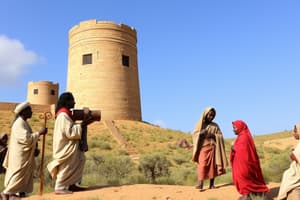Podcast
Questions and Answers
How did Ethiopia's liturgical practices develop?
How did Ethiopia's liturgical practices develop?
- Through the influence of early Nubian traditions.
- From the Latin liturgy of the Western Church.
- By adopting practices from the Roman Church.
- From the Coptic liturgy of Alexandria. (correct)
What role did King Caleb or Elesbaan play in the history of Ethiopia?
What role did King Caleb or Elesbaan play in the history of Ethiopia?
- He greatly influenced Greek culture in Ethiopia.
- He established the first Ethiopian liturgy.
- He was the first Ethiopian abuna appointed in 1951.
- He led an expedition to defend Christians in southern Arabia. (correct)
What was the status of the Ethiopian church's leadership until 1951?
What was the status of the Ethiopian church's leadership until 1951?
- It was independently led by Ethiopian bishops.
- It was under the leadership of the Byzantine Emperor.
- It was in communion with the Eastern Orthodox Patriarchate.
- It was governed by the patriarch of Alexandria with Egyptian heads. (correct)
Which theological stance did Ethiopia take in relation to the Council of Chalcedon?
Which theological stance did Ethiopia take in relation to the Council of Chalcedon?
What significant cultural contribution did Ethiopia make to Christian heritage?
What significant cultural contribution did Ethiopia make to Christian heritage?
What was the primary language spoken by the Ethiopian upper class from the fourth to the seventh century?
What was the primary language spoken by the Ethiopian upper class from the fourth to the seventh century?
What were the unique practices established in Ethiopian liturgy?
What were the unique practices established in Ethiopian liturgy?
What was one consequence of the rise of Islam in the seventh century for Ethiopia?
What was one consequence of the rise of Islam in the seventh century for Ethiopia?
Flashcards are hidden until you start studying
Study Notes
Ethiopia's Rise and Power
- Ethiopia was a dominant nation in the early centuries and actively protected Christianity in neighboring regions like southern Arabia and Nubia.
- In the 6th century, King Caleb (Elesbaan) led a campaign against those responsible for the massacre of Christians in Najran in 523.
- This event contributed significantly to solidifying Ethiopia's position as a Christian kingdom with a unique identity.
Distinct Ethiopian Christian Practices
- By the 5th century, Ethiopia developed its own distinct liturgy, stemming from the Coptic traditions of Alexandria.
- The unique aspects included liturgical texts, rituals, dance, music (including the use of drums), art, and architecture.
- These practices were evident in architectural marvels like the Lalibela churches carved from living rock.
- Ethiopia also played a vital role in Christian heritage through its own translation of scriptures, unique interpretations of patristic texts, and a strong monastic tradition.
Ethiopian Church's Connection to the Patriarchate
- The Ethiopian Church remained liturgically and canonically part of the Patriarchate of Alexandria.
- Until the mid-20th century, the head of the Ethiopian Church, the Abuna (Metropolitan), was always ordained by the Patriarch of Alexandria, an Egyptian.
- This practice ended in 1951 when an Ethiopian was chosen as the Abuna.
Theological Diversity in Ethiopia
- Theologically, Ethiopia, alongside Nubia, diverged from Rome and Constantinople's stance at the Council of Chalcedon in 451.
- Ethiopia, therefore, primarily adheres to the Monophysite doctrine, a distinct theological understanding of Christ.
- However, a smaller community, the Eastern Rite Ethiopian Church, aligned with Rome, exists.
Political and Cultural Influences on Ethiopia
- During the 4th to 7th centuries, Ethiopia maintained a strategic political partnership with the Byzantine Empire in the Red Sea region.
- This alliance led to significant Greek influence on Ethiopia, with the language becoming common at court and among the elite.
- The rise of Islam in the 7th century and its expansion into Africa significantly diminished links with the Byzantine Empire and the Mediterranean world.
Studying That Suits You
Use AI to generate personalized quizzes and flashcards to suit your learning preferences.




